
Aug 22, 2015 | Focolare Worldwide
 “Since 1994 I have worked in the Pastoral Jail of the Archdiocese of Santiago in Cuba which also includes the city of Guantanamo. Together with other volunteers we see to their needs and those of their relatives, because these people are really the poorest among the poor. In 2007, when I encountered the spirituality of unity, it was if a ray of light penetrated me, and more than ever enlightened my service in jail and made me understand that in life we have to look for what unites and not what divides us. Sharing this way of life with others helped me a lot. Some said: «How can you deal with murderers and rapists, knowing that most of them do not even take notice of those who try to give them a hand…». This is true. At times it is so, but the spirituality of Chiara Lubich helps me to see in each of them the figure of Jesus crucified and abandoned. We only have to sow that small seed of the Gospel, without expecting anything in return. This conviction gives me strength and support and makes me feel less alone. It prevents me from falling into the temptation of leaving this service, and I can see that in the end, I will always receive more than what I have given. It has been some time now since we started to bring the leaflet of the Word of Life every month to the prisoners and also their families. After some time, to our great surprise, we found that in the special surveillance sector, a small community of prisoners was created, led by a young man. Together they discuss about the contents of the leaflet and during the month they try to put it into practice and make really significant experiences. “In my youth–Y recounted– I committed some crimes for which I am serving a life sentence. I am in the Guantanamo city jail (not far from the ill-famed American high-security jail). I found my faith in God through the members of the Focolare Movement, who for some years now have been visiting me regularly. I also wrote my story, where I talk about my meeting with God and of how it rekindled the hope in unending Life. Every day I try to put the Word of Life of the month into practice.» One day, another prisoner, Y, told us on the phone: «I’m down with fever and have a strong headache. I really needed to talk to you and took the opportunity of a permit to call you. Talking to you is like a balsam for me. » I ensured him that we were praying for him, and that Jesus came to save us, notwithstanding the life we live on earth. He said that he was also convinced of this and added «this is what I pray for daily, and it gives me the strength to go on loving everyone.” (Carmen, Santiago di Cuba)
“Since 1994 I have worked in the Pastoral Jail of the Archdiocese of Santiago in Cuba which also includes the city of Guantanamo. Together with other volunteers we see to their needs and those of their relatives, because these people are really the poorest among the poor. In 2007, when I encountered the spirituality of unity, it was if a ray of light penetrated me, and more than ever enlightened my service in jail and made me understand that in life we have to look for what unites and not what divides us. Sharing this way of life with others helped me a lot. Some said: «How can you deal with murderers and rapists, knowing that most of them do not even take notice of those who try to give them a hand…». This is true. At times it is so, but the spirituality of Chiara Lubich helps me to see in each of them the figure of Jesus crucified and abandoned. We only have to sow that small seed of the Gospel, without expecting anything in return. This conviction gives me strength and support and makes me feel less alone. It prevents me from falling into the temptation of leaving this service, and I can see that in the end, I will always receive more than what I have given. It has been some time now since we started to bring the leaflet of the Word of Life every month to the prisoners and also their families. After some time, to our great surprise, we found that in the special surveillance sector, a small community of prisoners was created, led by a young man. Together they discuss about the contents of the leaflet and during the month they try to put it into practice and make really significant experiences. “In my youth–Y recounted– I committed some crimes for which I am serving a life sentence. I am in the Guantanamo city jail (not far from the ill-famed American high-security jail). I found my faith in God through the members of the Focolare Movement, who for some years now have been visiting me regularly. I also wrote my story, where I talk about my meeting with God and of how it rekindled the hope in unending Life. Every day I try to put the Word of Life of the month into practice.» One day, another prisoner, Y, told us on the phone: «I’m down with fever and have a strong headache. I really needed to talk to you and took the opportunity of a permit to call you. Talking to you is like a balsam for me. » I ensured him that we were praying for him, and that Jesus came to save us, notwithstanding the life we live on earth. He said that he was also convinced of this and added «this is what I pray for daily, and it gives me the strength to go on loving everyone.” (Carmen, Santiago di Cuba)
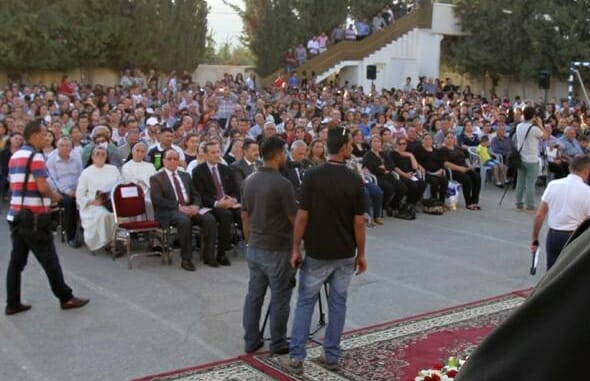
Aug 21, 2015 | Focolare Worldwide
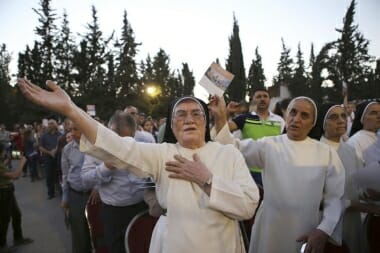
Aug. 8, 2015: Iraqi Christian refugees attend an outdoor prayer service to mark a year since their displacement, in Fuheis near Amman, Jordan. (AP Photo/Raad Adayleh)
 “Forty people came, including the Mayor of the city and several other civil authorities. The Cardinal, Patriarchs and Bishops wanted to spend some time in prayer in our chapel: a solemn moment.” This opportunity for Christians to be gathered together in prayerful unity was a strong summons especially during this period of great uncertainty in the Middle East. “A moment of relief for a martyred land.”
“Forty people came, including the Mayor of the city and several other civil authorities. The Cardinal, Patriarchs and Bishops wanted to spend some time in prayer in our chapel: a solemn moment.” This opportunity for Christians to be gathered together in prayerful unity was a strong summons especially during this period of great uncertainty in the Middle East. “A moment of relief for a martyred land.”
Aug 20, 2015 | Focolare Worldwide
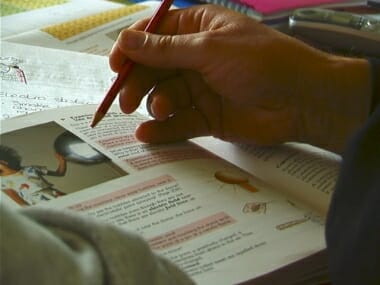
Aug 19, 2015 | Focolare Worldwide
 “My name is Marco and I am 35 years old. Since 2008 I have been working as a substitute Catholic religion teacher. Unfortunately, due to bureaucratic reasons, I work only sporadically, on an average of about two months a year. This year I was called for three days in a school, for a week in another school after some months, and then for a few days elsewhere. On the average, it was about two months a year. In my capacity as an employee of the State I am not allowed to have two jobs and have to be available all the time when I am called to teach, since – should I refuse – I would be surpassed by others. I live with my parents and have a lot of free time, I take care of various house chores, some other commitments in the parish, and the education of youth and adults of an oratory where I coordinate the Word of Life monthly meeting; I do volunteer work in a home for the aged and am a member of the diocesan office for ecumenism and interreligious dialogue. All these activities keep me busy and active. But when work is scarce, a subtle veil of discouragement and low self-esteem grow in me, and everything always seems to become more difficult. One day, a friend, knowing about my work situation, phoned to say that he had met a student who needed tutoring in Latin and Greek. My friend knew about my educational background and was certain that I could easily fill the post. In effect, after High School I had never abandoned my knowledge of the classical languages. In fact, in order to understand the Old Testament better, I had recently even started to study biblical Jewish. Initially my first reaction was to refuse the offer, but I was given 10 days to think it over. Then, the student would have turned to other private tutors. Those who are familiar with the art of translating old languages are aware that translating for oneself or trying one’s hand in translating is one thing, and that giving private lessons to a person who needs to progress and achieve good grades on the report card, is another thing altogether. I needed a job even though this meant revising the grammar rules of Greek and Latin in ten days, and learning to teach it. To be able to succeed I would have had to drop all my other commitments for seven days and study from 8-10 hours a day. It was like a leap in the dark. And so it was: I started to study like crazy. And then, after a few days, the same friend offered me a room in his house, and even the keys to the house. Another friend who came to know about my “new job” introduced me also to his son who needed tutoring. But more than a teacher, he needed tutoring not only in Latin and Greek but also in philosophy, Italian and English literature, in short, the whole humanistic area. He was a desperate case. In fact he was a very problematic person in terms of relationships, and in the last year of high school had been given an “unclassified” grade. I entrusted myself to God and accepted to be his tutor. Today he has started to get a set of 8s and 9s and his enthusiasm is growing. Even his personal relationships have started to improve. I recently worked as substitute teacher for a month, continue to give private lessons in the afternoon and also keep up with my previous commitments.”
“My name is Marco and I am 35 years old. Since 2008 I have been working as a substitute Catholic religion teacher. Unfortunately, due to bureaucratic reasons, I work only sporadically, on an average of about two months a year. This year I was called for three days in a school, for a week in another school after some months, and then for a few days elsewhere. On the average, it was about two months a year. In my capacity as an employee of the State I am not allowed to have two jobs and have to be available all the time when I am called to teach, since – should I refuse – I would be surpassed by others. I live with my parents and have a lot of free time, I take care of various house chores, some other commitments in the parish, and the education of youth and adults of an oratory where I coordinate the Word of Life monthly meeting; I do volunteer work in a home for the aged and am a member of the diocesan office for ecumenism and interreligious dialogue. All these activities keep me busy and active. But when work is scarce, a subtle veil of discouragement and low self-esteem grow in me, and everything always seems to become more difficult. One day, a friend, knowing about my work situation, phoned to say that he had met a student who needed tutoring in Latin and Greek. My friend knew about my educational background and was certain that I could easily fill the post. In effect, after High School I had never abandoned my knowledge of the classical languages. In fact, in order to understand the Old Testament better, I had recently even started to study biblical Jewish. Initially my first reaction was to refuse the offer, but I was given 10 days to think it over. Then, the student would have turned to other private tutors. Those who are familiar with the art of translating old languages are aware that translating for oneself or trying one’s hand in translating is one thing, and that giving private lessons to a person who needs to progress and achieve good grades on the report card, is another thing altogether. I needed a job even though this meant revising the grammar rules of Greek and Latin in ten days, and learning to teach it. To be able to succeed I would have had to drop all my other commitments for seven days and study from 8-10 hours a day. It was like a leap in the dark. And so it was: I started to study like crazy. And then, after a few days, the same friend offered me a room in his house, and even the keys to the house. Another friend who came to know about my “new job” introduced me also to his son who needed tutoring. But more than a teacher, he needed tutoring not only in Latin and Greek but also in philosophy, Italian and English literature, in short, the whole humanistic area. He was a desperate case. In fact he was a very problematic person in terms of relationships, and in the last year of high school had been given an “unclassified” grade. I entrusted myself to God and accepted to be his tutor. Today he has started to get a set of 8s and 9s and his enthusiasm is growing. Even his personal relationships have started to improve. I recently worked as substitute teacher for a month, continue to give private lessons in the afternoon and also keep up with my previous commitments.”
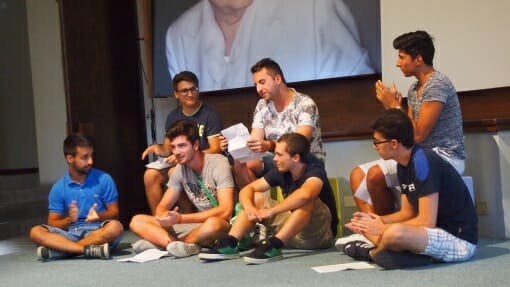
Aug 18, 2015 | Focolare Worldwide
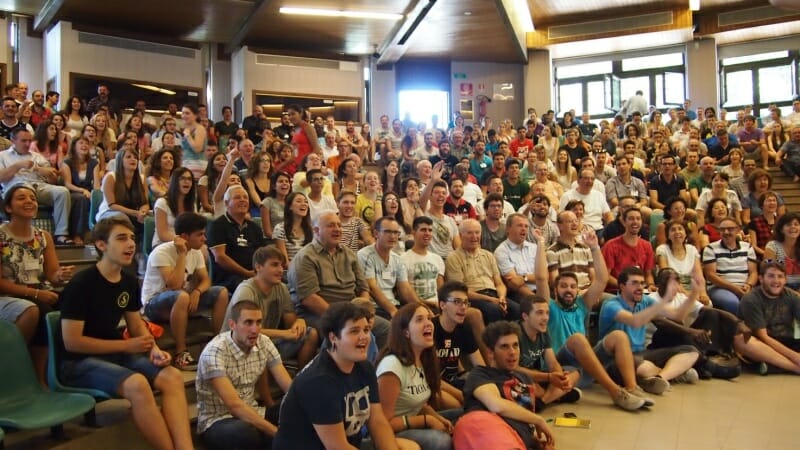 The somewhat quirky diversity of the hall at the Chiara Lubich Centre in Trent this year was a bit surprising: 250 young people between the ages of 16 and 30 from more than 20 countries; 70 priests and seminarians and some twenty adults who are all committed in living the spirituality of the Focolare at the parish or diocesan levels. What was the idea behind this meeting which was planned for the 2cnd to the 8th of August? What is the connection between the different cultural backgrounds? The first answer can be found in the title of the meeting: “Like yesterday,” and the second answer in the city of Trent itself. All of these young people and adults were gathered to reflect on the first generative seed of their own spiritual charism and to look back even physcially at the journey that has inspired the Focolare Movement from its beginnings. “The meeting opened in an atmosphere of explosive joy,’ Ludovico and Elonora recount. “The programme is meant to be an immersion in the life of those early days and the radicalness in living the Word.” The programme alternated between thematic topics and excursions to the places where the Focolare began: Piazza Cappuccini, Fiera di Primiero, Tonadico, Goccia d’Oro. “During the Mass in the Cappuchin church,” Zbyszek writes, “we declared ourselves ready with the help of Christ’s grace, to give our lives one for the other beginning from the small things of everyday life. In the place where God had sealed the pact of unity between Chiara and Igino Giordani (Foco), we also wishe to renew that mutual love which we wish to live as they did that yesterday.”
The somewhat quirky diversity of the hall at the Chiara Lubich Centre in Trent this year was a bit surprising: 250 young people between the ages of 16 and 30 from more than 20 countries; 70 priests and seminarians and some twenty adults who are all committed in living the spirituality of the Focolare at the parish or diocesan levels. What was the idea behind this meeting which was planned for the 2cnd to the 8th of August? What is the connection between the different cultural backgrounds? The first answer can be found in the title of the meeting: “Like yesterday,” and the second answer in the city of Trent itself. All of these young people and adults were gathered to reflect on the first generative seed of their own spiritual charism and to look back even physcially at the journey that has inspired the Focolare Movement from its beginnings. “The meeting opened in an atmosphere of explosive joy,’ Ludovico and Elonora recount. “The programme is meant to be an immersion in the life of those early days and the radicalness in living the Word.” The programme alternated between thematic topics and excursions to the places where the Focolare began: Piazza Cappuccini, Fiera di Primiero, Tonadico, Goccia d’Oro. “During the Mass in the Cappuchin church,” Zbyszek writes, “we declared ourselves ready with the help of Christ’s grace, to give our lives one for the other beginning from the small things of everyday life. In the place where God had sealed the pact of unity between Chiara and Igino Giordani (Foco), we also wishe to renew that mutual love which we wish to live as they did that yesterday.” 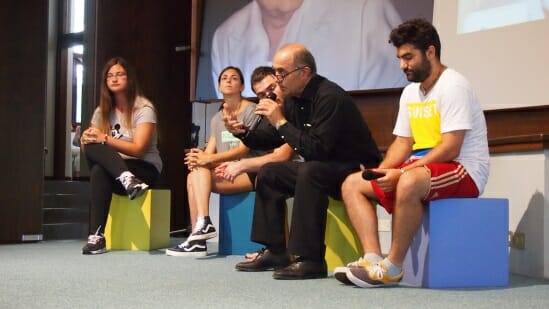 Then we had an opportunity to be enriched by presentations from experts in the fields of communication, interreligious dialogue and cooperation and development in the Action for a United World (AMU). Thanks to them we were able to reflect on communication and the challenges of our multiethnic and multi-religious society. Much time was dedicated to delving into the topics of immigration and welcoming thanks to the precious collaboration by the Cinformi Project, which presented the model of welcoming that has been proposed and applied by the city of Trent, placing itself at our service with active workshops involving two visits to refugee camps. Some of the most unforgettable moments of the meeting were spent with a hundred refugees who are waiting to see what the future will bring.
Then we had an opportunity to be enriched by presentations from experts in the fields of communication, interreligious dialogue and cooperation and development in the Action for a United World (AMU). Thanks to them we were able to reflect on communication and the challenges of our multiethnic and multi-religious society. Much time was dedicated to delving into the topics of immigration and welcoming thanks to the precious collaboration by the Cinformi Project, which presented the model of welcoming that has been proposed and applied by the city of Trent, placing itself at our service with active workshops involving two visits to refugee camps. Some of the most unforgettable moments of the meeting were spent with a hundred refugees who are waiting to see what the future will bring.  Several of them came to see us at the meeting. Rita confided: “I was so struck by Lamin, a young Muslim from Ghana who had written a poem to his mother and wished to read it to everyone. It was a poem filled with nostalgia but also hope. The eyes of these people says it all and they can never forget.” At the conclusion of the meeting two goals were set – one short-term and the other long-term: the World Youth Day meeting (WYD) in Poland; and the unity of the world in accordance with Jesus’s prayer that all be one for which we wish to spend our lives. “We leave committed to becoming the ‘living Word,” Danilo and Emmanuele write and to take this “pure water from the source” into our own lands and into our daily life in our peripheries, offering it to every neighbour that goes by.”
Several of them came to see us at the meeting. Rita confided: “I was so struck by Lamin, a young Muslim from Ghana who had written a poem to his mother and wished to read it to everyone. It was a poem filled with nostalgia but also hope. The eyes of these people says it all and they can never forget.” At the conclusion of the meeting two goals were set – one short-term and the other long-term: the World Youth Day meeting (WYD) in Poland; and the unity of the world in accordance with Jesus’s prayer that all be one for which we wish to spend our lives. “We leave committed to becoming the ‘living Word,” Danilo and Emmanuele write and to take this “pure water from the source” into our own lands and into our daily life in our peripheries, offering it to every neighbour that goes by.”
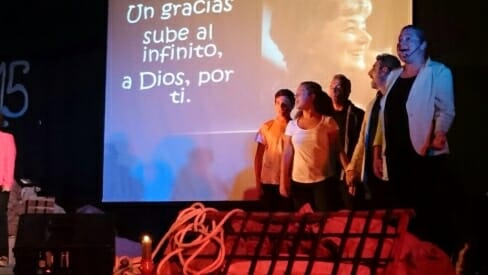
Aug 16, 2015 | Focolare Worldwide, Senza categoria
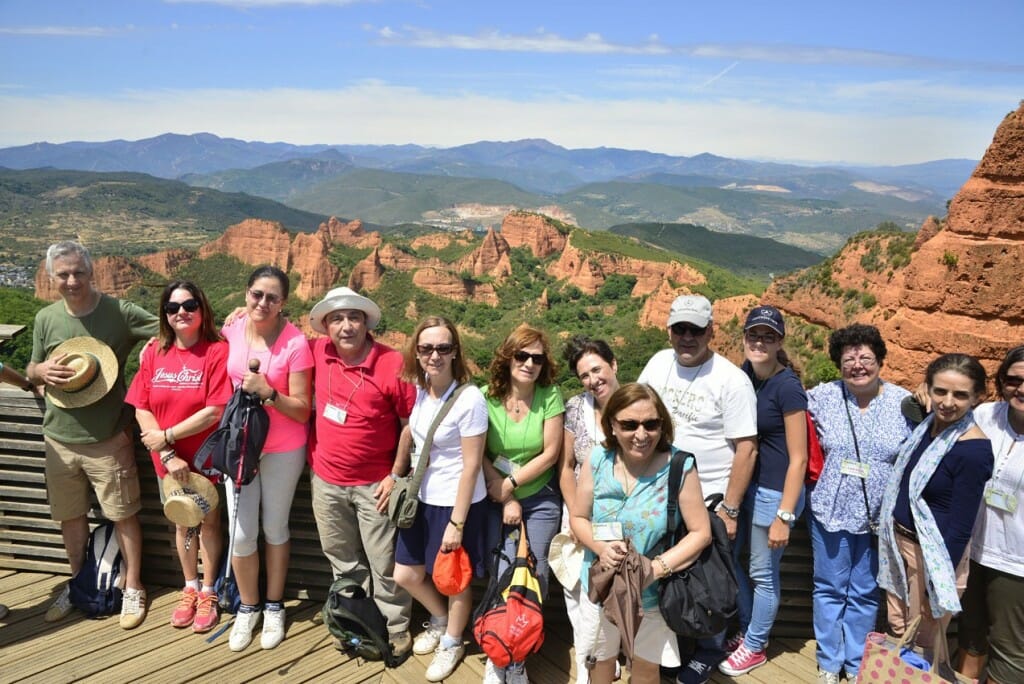 One person attending the Mariapolis in Astorga for the first time described it as a “heart to heart meeting.” It was just one of the many similar Mariapolises that are underway or have already taken place across Europe and in many other lands. The Mariapolis of August 2-6 was a peaceful “invasion” of the town by 800 people from several parts of Spain, but also from France, Italy, Germany and Brazil. During excursions to monuments and museums, at Mass celebrated in the Gothic Cathedral, or during the evening concerts with all types of music – the streets were crowded with people from the Mariapolis. And the local citizens of Astorga whose curiosity had been aroused by the fraternal spirit of those people, responded in kind. One woman stopped a girl who was walking down the street to thank her for the presence of such a joyful group in their city. The balance between periods of relaxation, formation, dialogue, listening to testimonies and play was much appreciated. It was a good mix that contributed to the objectives of the Mariapolis: to favour an encounter with oneself, God, and others. One participant observed: “It wasn’t a crescendo that began at a one level and then progressed in quality or intensity. Each day was full, complete, and totally valuable in itself.” Amongst the activities for children and teens were several marches in the city, with stops in certain streets and squares where activities were held. The Astorga Mariapolis was also on Facebook, a virtual meeting spot for both the participants and for those who could not physically attend. Many contributed photos that can still be accessed online. Some of the comments: https://www.facebook.com/mariapolisastorga2015 “This is my first Mariapolis,” Cati writes. “These days were filled with brotherhood, love and unity. My family and I thank everyone who made this wonderful event possible;” “I’m still on my way home towards Toledo,” writes Paco. “I take the opportunity to thank everyone for these past few days. I have to say that it was a Mariapolis filled with graces.”
One person attending the Mariapolis in Astorga for the first time described it as a “heart to heart meeting.” It was just one of the many similar Mariapolises that are underway or have already taken place across Europe and in many other lands. The Mariapolis of August 2-6 was a peaceful “invasion” of the town by 800 people from several parts of Spain, but also from France, Italy, Germany and Brazil. During excursions to monuments and museums, at Mass celebrated in the Gothic Cathedral, or during the evening concerts with all types of music – the streets were crowded with people from the Mariapolis. And the local citizens of Astorga whose curiosity had been aroused by the fraternal spirit of those people, responded in kind. One woman stopped a girl who was walking down the street to thank her for the presence of such a joyful group in their city. The balance between periods of relaxation, formation, dialogue, listening to testimonies and play was much appreciated. It was a good mix that contributed to the objectives of the Mariapolis: to favour an encounter with oneself, God, and others. One participant observed: “It wasn’t a crescendo that began at a one level and then progressed in quality or intensity. Each day was full, complete, and totally valuable in itself.” Amongst the activities for children and teens were several marches in the city, with stops in certain streets and squares where activities were held. The Astorga Mariapolis was also on Facebook, a virtual meeting spot for both the participants and for those who could not physically attend. Many contributed photos that can still be accessed online. Some of the comments: https://www.facebook.com/mariapolisastorga2015 “This is my first Mariapolis,” Cati writes. “These days were filled with brotherhood, love and unity. My family and I thank everyone who made this wonderful event possible;” “I’m still on my way home towards Toledo,” writes Paco. “I take the opportunity to thank everyone for these past few days. I have to say that it was a Mariapolis filled with graces.”  A project was proposed that would bring the Mariapolis spirit into daily life: “We’re all Mediterranean” to help inform European citizens on the drama of immigration that is taking place in our common Mediterranean Sea, from southern borders, from disadvantaged and war-torn lands, in search for better living conditions. This project, which is in harmony with the theme of this year’s Mariapolis (“Paths that meet”) involves a collection of signatures to petition the European Union for a significant change in migration policy. On the last day of the Mariapolis when the participants were asked for their evaluation of the event, everyone said they were satisfied, especially with regard to the way they felt welcomed from the moment they arrived, even those who were attending for the first time. The town of Astorga built to a human scale and with such a pleasant climate, combined so many features that helped facilitate the coming together which was the goal of the Mariapolis. For this reason the organisers of the Mariapolis write: “the Focolare Movement expresses its warm gratitude to the Diocese and Town Administration for their exquisite collaboration.”
A project was proposed that would bring the Mariapolis spirit into daily life: “We’re all Mediterranean” to help inform European citizens on the drama of immigration that is taking place in our common Mediterranean Sea, from southern borders, from disadvantaged and war-torn lands, in search for better living conditions. This project, which is in harmony with the theme of this year’s Mariapolis (“Paths that meet”) involves a collection of signatures to petition the European Union for a significant change in migration policy. On the last day of the Mariapolis when the participants were asked for their evaluation of the event, everyone said they were satisfied, especially with regard to the way they felt welcomed from the moment they arrived, even those who were attending for the first time. The town of Astorga built to a human scale and with such a pleasant climate, combined so many features that helped facilitate the coming together which was the goal of the Mariapolis. For this reason the organisers of the Mariapolis write: “the Focolare Movement expresses its warm gratitude to the Diocese and Town Administration for their exquisite collaboration.”

 “Since 1994 I have worked in the Pastoral Jail of the Archdiocese of Santiago in Cuba which also includes the city of Guantanamo. Together with other volunteers we see to their needs and those of their relatives, because these people are really the poorest among the poor. In 2007, when I encountered the spirituality of unity, it was if a ray of light penetrated me, and more than ever enlightened my service in jail and made me understand that in life we have to look for what unites and not what divides us. Sharing this way of life with others helped me a lot. Some said: «How can you deal with murderers and rapists, knowing that most of them do not even take notice of those who try to give them a hand…». This is true. At times it is so, but the spirituality of Chiara Lubich helps me to see in each of them the figure of Jesus crucified and abandoned. We only have to sow that small seed of the Gospel, without expecting anything in return. This conviction gives me strength and support and makes me feel less alone. It prevents me from falling into the temptation of leaving this service, and I can see that in the end, I will always receive more than what I have given. It has been some time now since we started to bring the leaflet of the Word of Life every month to the prisoners and also their families. After some time, to our great surprise, we found that in the special surveillance sector, a small community of prisoners was created, led by a young man. Together they discuss about the contents of the leaflet and during the month they try to put it into practice and make really significant experiences. “In my youth–Y recounted– I committed some crimes for which I am serving a life sentence. I am in the Guantanamo city jail (not far from the ill-famed American high-security jail). I found my faith in God through the members of the Focolare Movement, who for some years now have been visiting me regularly. I also wrote my story, where I talk about my meeting with God and of how it rekindled the hope in unending Life. Every day I try to put the Word of Life of the month into practice.» One day, another prisoner, Y, told us on the phone: «I’m down with fever and have a strong headache. I really needed to talk to you and took the opportunity of a permit to call you. Talking to you is like a balsam for me. » I ensured him that we were praying for him, and that Jesus came to save us, notwithstanding the life we live on earth. He said that he was also convinced of this and added «this is what I pray for daily, and it gives me the strength to go on loving everyone.” (Carmen, Santiago di Cuba)
“Since 1994 I have worked in the Pastoral Jail of the Archdiocese of Santiago in Cuba which also includes the city of Guantanamo. Together with other volunteers we see to their needs and those of their relatives, because these people are really the poorest among the poor. In 2007, when I encountered the spirituality of unity, it was if a ray of light penetrated me, and more than ever enlightened my service in jail and made me understand that in life we have to look for what unites and not what divides us. Sharing this way of life with others helped me a lot. Some said: «How can you deal with murderers and rapists, knowing that most of them do not even take notice of those who try to give them a hand…». This is true. At times it is so, but the spirituality of Chiara Lubich helps me to see in each of them the figure of Jesus crucified and abandoned. We only have to sow that small seed of the Gospel, without expecting anything in return. This conviction gives me strength and support and makes me feel less alone. It prevents me from falling into the temptation of leaving this service, and I can see that in the end, I will always receive more than what I have given. It has been some time now since we started to bring the leaflet of the Word of Life every month to the prisoners and also their families. After some time, to our great surprise, we found that in the special surveillance sector, a small community of prisoners was created, led by a young man. Together they discuss about the contents of the leaflet and during the month they try to put it into practice and make really significant experiences. “In my youth–Y recounted– I committed some crimes for which I am serving a life sentence. I am in the Guantanamo city jail (not far from the ill-famed American high-security jail). I found my faith in God through the members of the Focolare Movement, who for some years now have been visiting me regularly. I also wrote my story, where I talk about my meeting with God and of how it rekindled the hope in unending Life. Every day I try to put the Word of Life of the month into practice.» One day, another prisoner, Y, told us on the phone: «I’m down with fever and have a strong headache. I really needed to talk to you and took the opportunity of a permit to call you. Talking to you is like a balsam for me. » I ensured him that we were praying for him, and that Jesus came to save us, notwithstanding the life we live on earth. He said that he was also convinced of this and added «this is what I pray for daily, and it gives me the strength to go on loving everyone.” (Carmen, Santiago di Cuba)







